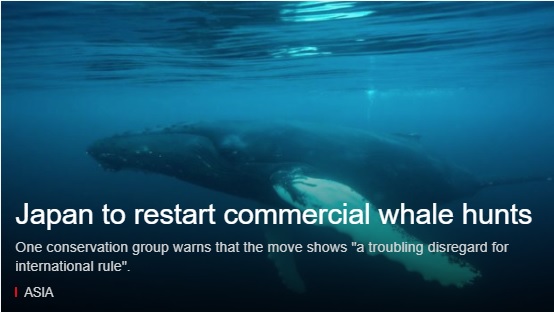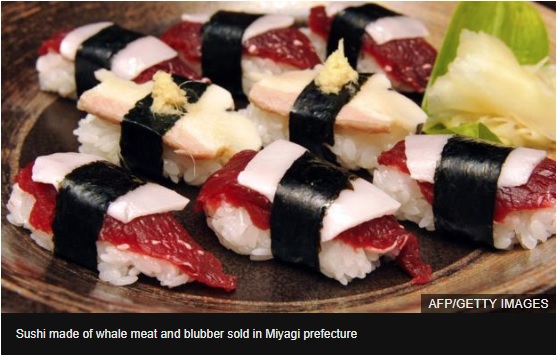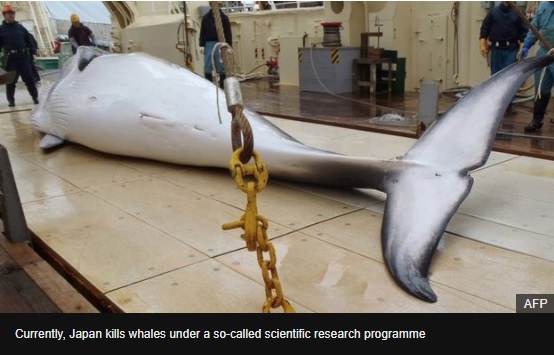
Japan says it is to restart commercial whaling in July in a move that is likely to draw international criticism.
It said it would withdraw from the International Whaling Commission (IWC), the body tasked with whale conservation.
Commercial whaling was banned by the IWC in 1986 after some species were driven almost to extinction.
Officials in Japan, an IWC member since 1951, say eating whales is part of the country's culture.
For many years Japan has hunted whales for what it calls "scientific research" and to sell the meat, a programme widely criticised by conservationists.
Wednesday's announcement had been expected, but conservation groups warn the move will have serious consequences.
It means Japan will be able to freely hunt species currently protected by the IWC, like minke whales.
What did Japan just announce?
Government spokesman Yoshihide Suga said commercial whaling would be restricted to Japanese territorial waters and economic zones.
As a result, Japan will stop hunting in Antarctic waters and the southern hemisphere, a prospect conservation groups had welcomed before it was formally confirmed.
A statement by Japan's government said the IWC was not committed enough to one of its goals, of supporting sustainable commercial whaling.
It accused the IWC of being focused only on the aim of conserving numbers.

A number of coastal communities in Japan have hunted whales for centuries, but consumption in the country surged only after World War Two when whales were the main source of meat. It has plummeted in recent decades.
According to Japan's Asahi newspaper, whale meat makes up only 0.1% of all meat sold in Japan.
What's been the reaction?
In a joint statement, Australia's Foreign Minister Marise Payne and Environment Minister Melissa Price said they were "extremely disappointed" with Japan's decision.
"Australia remains resolutely opposed to all forms of commercial and so-called 'scientific' whaling," the statement added.
Before the formal announcement was made, Nicola Beynon, head of campaigns at Humane Society International in Australia, said Japan would be "operating completely outside the bounds of international law".
She added: "This is the path of a pirate whaling nation, with a troubling disregard for international rule."
Greenpeace Japan urged the government to reconsider, and warned it would risk criticism as the host of the G20 summit in June.
Sam Annesley, Greenpeace Japan's executive director, said: "It's clear that the government is trying to sneak in this announcement at the end of year, away from the spotlight of international media, but the world sees this for what it is.
"The declaration today is out of step with the international community, let alone the protection needed to safeguard the future of our oceans and these majestic creatures."
What is the current whaling ban?
In 1986, IWC members agreed to a moratorium on hunting to allow stocks to recover.
Pro-whaling nations expected the moratorium to be temporary, until consensus could be reached on sustainable catch quotas.

Instead, it became a quasi-permanent ban. Whaling nations, such as Japan, Norway and Iceland, however argue the practice is part of their culture and should continue in a sustainable way.
Today, whale stocks are carefully monitored, and while many species are still endangered, others - like the minke whale that Japan primarily hunts - are not.
In September, Tokyo tried to get the IWC to allow commercial catch quotas but the proposal was rejected.

